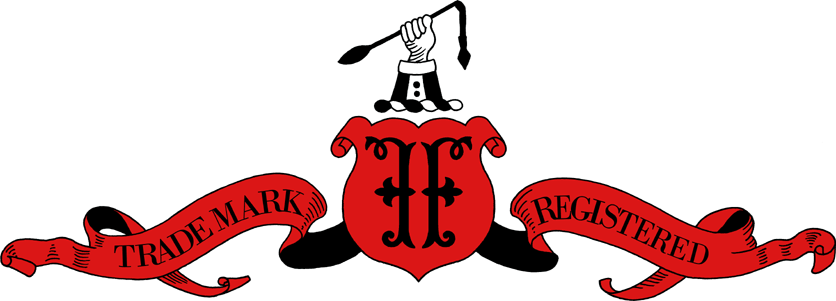 |
 |
|||
|
By 1770, the Angel had become a thriving coaching inn. The ‘Reading Flying Machine’ left the premises for the Bolt & Tun Inn in Fleet Street (London) every morning at 5 o’clock and returned the same day. It was “hung on steel springs built sufficiently roomy and on the very best construction for carrying passengers easy”. The place was a popular venue for occasional auctions and sales and, throughout its life, was a meeting place for groups such as estate creditors, turnpike trustees and lodges, like the Court of the Merry Men of Sherwood. In 1820, William Parsons (1768-1861) from Swinderby in Lincolnshire took on the inn. He described it as a ‘Commercial Inn & Livery Stables’ and set up further coaching services: the Reading & Wallingford Sociable Coach to Wallingford, the Accommodation Coach to London, the Alert Coach to Piccadilly & Cheapside via Wokingham, Bracknell & Sunninghill. By the late 1850s, Parsons’ son-in-law, Thomas Frankland (1812-1891) (who grew up at the Crown Inn in Reading’s Crown Street and later of the Crown Brewery in Hungerford High Street), was running the ale & porter sales side of the business, while William, assisted by his daughter, Caroline (1817-1896), stuck with the hotel. Parsons also had a nephew, Richard Parsons (1804-1887), who was a “bookseller, stationer, printer & bookbinder” at 16 Duke Street, although he had left for Bridge Street in Abingdon in February 1835.
JM Ferguson was not long at the Angel, however, as he, unfortunately, died in July 1862. His widow, Mrs. Mary Ann Ferguson, struggled on for a while, even hosting a celebratory dinner at the Angel for the tradesmen of Broad Street to mark completion of the demolition of Middle Row. This was the start of annual tradesmen's dinners that continued afterwards at other locations. Almost exactly a year after her husband’s death, Mrs Ferguson transferred the license to her brother-in-law, William Henry Ferguson (1810-1895) who had been running a wine & spirit merchant’s at 20-21 Market Place (later the Market Place Chambers). This appears to have previously been in the hands of their father, William Ferguson (1782-1856) of Woodcote, as it was certainly established before 1827. The grandfather, James Ferguson, (1761-1813) seems to have been a linen draper, also in the Market Place. WH Ferguson immediately closed down the inn and sold off the furniture including its mahogany four-poster, press, brass-mounted, iron and French bedsteads. By the end of July 1863, it was reported that “the Angel Inn, Broad Street, lately purchased by Mr Ferguson of the Market Place, is now levelled to the ground with the view we believe of building a larger and more commodious structure for a wholesale and retail wine and spirits trade. We hope the building will add to the architectural appearance of the street” for “In the course of time it is to be expected that a good many other houses in the same street (and the great majority are more unsightly than the Angel ever was) will be similarly demolished and rebuilt. The street will then be without question, a very fine one.”
WH Ferguson was in partnership with his son, William Ferguson Junior (1841-1916). The wine & spirit business was expanded to include brewing in June 1865, producing “best ales from pure malt and
hops at moderate prices”. The Angel Brewery Tap was quickly opened, under a manager, at No, 117, next door. Their wine cellar stretched all the way under Nos. 114 to
119 and the various brewhouses, behind the building, extended right through to
Minster
Street, where there was a walkway through between Nos 20 & 21, but no shop frontage.
The company became known as the ‘Angel Brewery, Wine & Spirit Warehouse,’ selling Bass’s India Pale Ale and London Double Stout, as well as being a
depot and sole Berkshire agent for Max Greger’s Hungarian Wines “as supplied to Her Majesty the Queen” and Kinahan’s LL Whisky. Their own brands included Genuine
Family Pale Ale & Porter, Superior Pale Ale & Porter, X Ale, AK
Pale Ale, Imperial Stout, Ferguson’s Celebrated Stout, Celebrated Reading Cooper and Anglo-Saxon Beer. Their Nourishing Stout was given the only silver
Brewing seems to have been reduced in 1905, when Heelas purchased most of the brewery yard. Morland's Brewery of Abingdon then bought an interest in the business in 1914, and brewing ceased. The brewery tap reverted to being simply the Angel Public House and the rest of the building was retained as the company’s offices. Morland's took full control in 1943, when the company merged with their Dymore Brown Albert Brewery in Queen’s Road. The latter name, however, ceased to be used the following year. Many of the old Morland pubs in Reading, sporting the ceramic artist logo, were originally Ferguson premises. Morland's eventually closed the old Angel Brewery and Tap building in 1964, when, after 101 years, it was sadly demolished and the modernist British Homes Stores built in its place. This closed in 2016 and was subsequently rebuilt.
Many thanks to Joseph Wesolowski for permission to use his images of inside Ferguson's.
|
|||
| © Nash Ford Publishing 2017. All Rights Reserved. | ||||






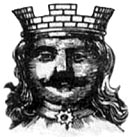
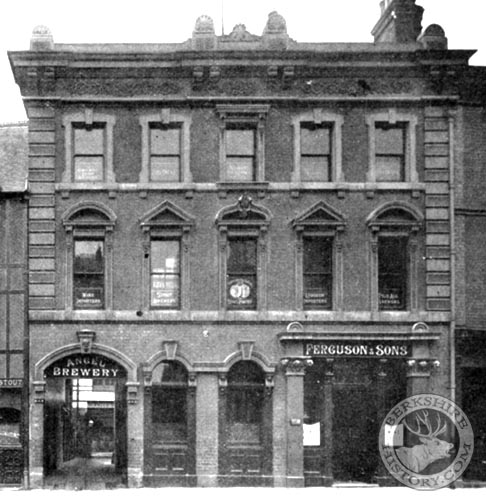 The Angel Inn at No 116
The Angel Inn at No 116
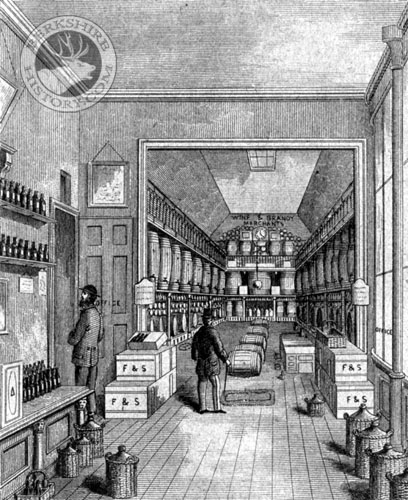 Perhaps there was some connection here with John Mansfield Ferguson (1811-1862) who acquired the license for the White Hart, two doors down, at No 20 Duke Street on the corner with the (old) King’s Road, in 1847. It became known as a ‘Wholesale & Retail Wine & Spirit Establishment’. He held a second property at No 1 High Street, and had previously been undertaking the same trade at Nos 15-16 Broad Street. In January 1861, William Parsons died and, in the August following, Ferguson purchased the Angel from the Franklands, announcing “JM Ferguson respectfully informs the public that he has entered upon the Angel Hotel, Broad Street, Reading, and re-opened it for the accommodation of families and commercial gentlemen, who will find the above old-established hotel refitted with new furniture suitable for requirements of those who may favour him with their patronage.”
Perhaps there was some connection here with John Mansfield Ferguson (1811-1862) who acquired the license for the White Hart, two doors down, at No 20 Duke Street on the corner with the (old) King’s Road, in 1847. It became known as a ‘Wholesale & Retail Wine & Spirit Establishment’. He held a second property at No 1 High Street, and had previously been undertaking the same trade at Nos 15-16 Broad Street. In January 1861, William Parsons died and, in the August following, Ferguson purchased the Angel from the Franklands, announcing “JM Ferguson respectfully informs the public that he has entered upon the Angel Hotel, Broad Street, Reading, and re-opened it for the accommodation of families and commercial gentlemen, who will find the above old-established hotel refitted with new furniture suitable for requirements of those who may favour him with their patronage.”
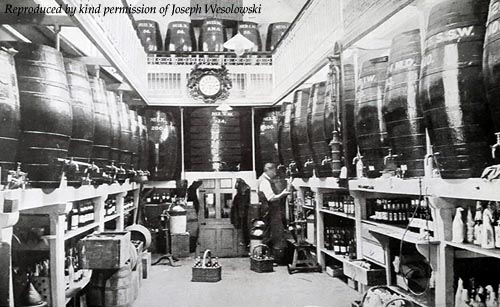 The architect chosen to design this “new and improved edifice … built on the same site” was William Brown Senior of 154 Friar Street. Although, the owner’s nephew, John
Mansfield Ferguson Junior (1846-1927), no doubt, would have taken a great interest in the work, as he was then articled to Charles Smith, architect, of 164 Friar Street. He later undertook an architectural drawing of the building. The builders were Messrs J Matthews and J Wheeler, and progress was swift. There was a celebratory dinner held for the workmen at the Black Horse (London Street) in the October, and the structure was certainly completed by the December. The interior was decorated with tiles depicting scenes of Reading’s past painted by W Rowe and made by Doulton & Co of London; and there were handsome door plates at the entrance, engraved ‘Ferguson and son, importers of wines and spirits’.
The architect chosen to design this “new and improved edifice … built on the same site” was William Brown Senior of 154 Friar Street. Although, the owner’s nephew, John
Mansfield Ferguson Junior (1846-1927), no doubt, would have taken a great interest in the work, as he was then articled to Charles Smith, architect, of 164 Friar Street. He later undertook an architectural drawing of the building. The builders were Messrs J Matthews and J Wheeler, and progress was swift. There was a celebratory dinner held for the workmen at the Black Horse (London Street) in the October, and the structure was certainly completed by the December. The interior was decorated with tiles depicting scenes of Reading’s past painted by W Rowe and made by Doulton & Co of London; and there were handsome door plates at the entrance, engraved ‘Ferguson and son, importers of wines and spirits’.
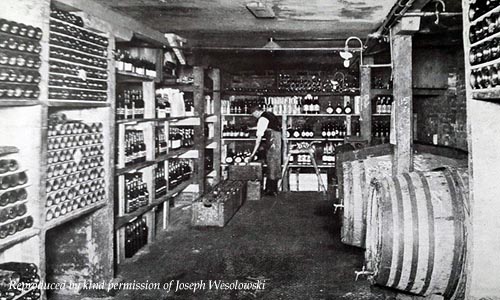 medal for Stout & Porter at the Paris Exhibition of 1878.
The company logo was a king's head crowned with a mural crown (left
margin), believed to represent
medal for Stout & Porter at the Paris Exhibition of 1878.
The company logo was a king's head crowned with a mural crown (left
margin), believed to represent 